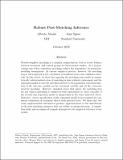| dc.contributor.author | Abadie, Alberto | |
| dc.date.accessioned | 2021-10-27T20:22:26Z | |
| dc.date.available | 2021-10-27T20:22:26Z | |
| dc.date.issued | 2020 | |
| dc.identifier.uri | https://hdl.handle.net/1721.1/135201 | |
| dc.description.abstract | <jats:p> Statistical significance is often interpreted as providing greater information than nonsignificance. In this article we show, however, that rejection of a point null often carries very little information, while failure to reject may be highly informative. This is particularly true in empirical contexts that are common in economics, where data-sets are large and there are rarely reasons to put substantial prior probability on a point null. Our results challenge the usual practice of conferring point null rejections a higher level of scientific significance than non-rejections. Therefore, we advocate visible reporting and discussion of nonsignificant results. (JEL C12, C90) </jats:p> | |
| dc.language.iso | en | |
| dc.publisher | American Economic Association | |
| dc.relation.isversionof | 10.1257/AERI.20190252 | |
| dc.rights | Creative Commons Attribution-Noncommercial-Share Alike | |
| dc.rights.uri | http://creativecommons.org/licenses/by-nc-sa/4.0/ | |
| dc.source | MIT web domain | |
| dc.title | Statistical Nonsignificance in Empirical Economics | |
| dc.type | Article | |
| dc.contributor.department | Massachusetts Institute of Technology. Department of Economics | |
| dc.relation.journal | American Economic Review: Insights | |
| dc.eprint.version | Author's final manuscript | |
| dc.type.uri | http://purl.org/eprint/type/JournalArticle | |
| eprint.status | http://purl.org/eprint/status/PeerReviewed | |
| dc.date.updated | 2021-03-25T16:23:39Z | |
| dspace.orderedauthors | Abadie, A | |
| dspace.date.submission | 2021-03-25T16:23:40Z | |
| mit.journal.volume | 2 | |
| mit.journal.issue | 2 | |
| mit.license | OPEN_ACCESS_POLICY | |
| mit.metadata.status | Authority Work and Publication Information Needed | |
